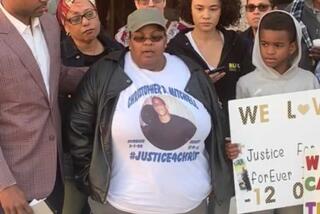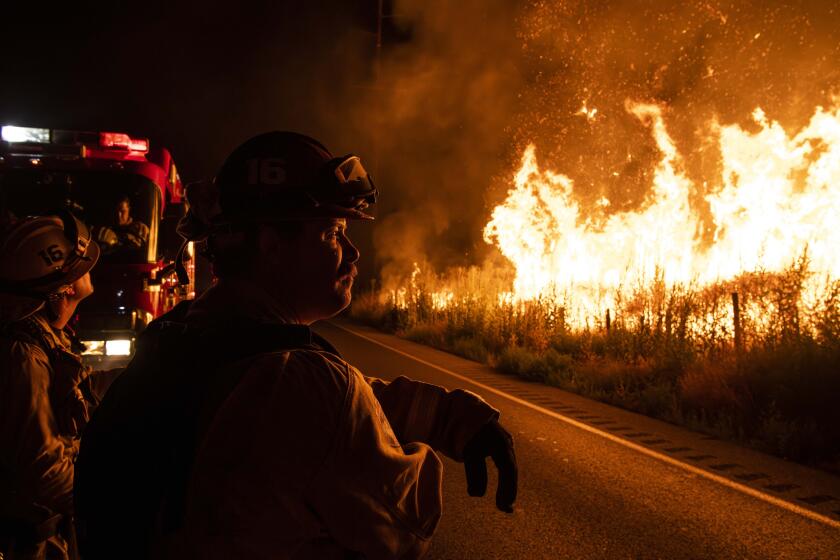Judge Upholds Searches of Simpson Bronco
- Share via
Handing another setback to O.J. Simpson’s defense team, Superior Court Judge Lance A. Ito on Thursday upheld repeated law enforcement searches of the football great’s white Ford Bronco--which turned up bloodstains, paperwork for the purchase of knives and an unscrewed light bulb that raised police suspicions.
Ito also squelched a defense campaign to recall as a witness Mark Fuhrman, a Los Angeles police detective whom Simpson’s lawyers have accused of racism; they also have suggested he may have planted a bloody glove at the Simpson estate.
Members of the defense team had sought to put Fuhrman back on the stand as part of their effort to throw out evidence seized in the initial search of Simpson’s home, and had argued that they should be allowed to recall him because they had only recently learned of past court cases and new allegations involving Fuhrman.
The most immediate effect of Ito’s ruling on the Fuhrman matter is that prosecutors probably will be able to introduce several potentially significant pieces of evidence found during a warrantless search of Simpson’s estate hours after the murders. Among those items was the bloody glove that matched one found at the murder scene.
Overall, Ito’s rulings Thursday ended the courtroom battling over all but a few lingering issues in the defense’s multi-pronged attempt to keep out evidence in the case. Prosecutors have prevailed on virtually every significant evidence dispute, and when Ito ruled in their favor Thursday, Nicole Brown Simpson’s sister, Denise Brown, grinned broadly from her seat in the second row and mouthed the word: “Yes!”
A day earlier, in a rare public comment on the case, Brown had questioned why Simpson’s attorneys were seeking to suppress evidence if their client is innocent of the June 12 killings of Nicole Simpson and Ronald Lyle Goldman. Simpson has pleaded not guilty, and his lawyers have long said that they believe the evidence in the case will establish Simpson’s innocence. At the same time, however, they also have insisted that he not be tried based on illegally seized items and have vigorously contested the various police searches in the case.
Simpson attorney Robert L. Shapiro said Thursday, however, that Denise Brown’s comments are understandable given “the trauma (the family) is going through.”
The disputes over evidence Thursday came as Ito and the attorneys in the case were rushing to tie up a number of loose ends before jury selection resumes next week. In other developments:
* Barry C. Scheck, a DNA expert representing Simpson, accused prosecutors of delaying DNA tests and failing to turn over other material in order to gain a tactical advantage over the Simpson team. Prosecutors said they were not stalling and were turning over material as quickly as they could.
* Ito told lawyers he hopes to begin a crucial DNA hearing Nov. 1, and advised them that he is considering calling his own witnesses in addition to those called by the two sides.
* Court personnel said Ito had relented on a threat to expel reporters from the Daily News of Los Angeles. Ito had been angered by a Daily News article on the jury questionnaire being used to aid the jury selection process, but a spokeswoman for the court said the judge had decided not to pursue the matter.
Before ruling on the issue of whether Simpson’s lawyers could recall Fuhrman to the witness stand, Ito had his law clerk run a computer check of public court files related to the detective. That search yielded results in less than 10 minutes, Ito said, adding that defense attorneys could therefore easily have conducted the same research prior to Fuhrman’s appearance during the preliminary hearing.
“I don’t think it is unreasonable for counsel, given the technological advances of today, for a critical witness to at least be run through a database to see what’s there,” Ito said. “I find that that burden has not been carried, and the request to recall Detective Fuhrman is denied.”
Shapiro acknowledged outside court that Ito’s ruling eliminates the defense’s final attempt to suppress evidence seized outside Simpson’s home hours after the killings--including the bloody glove.
“It’s finished at the trial level,” Shapiro said, though he added that defense attorneys still intend to challenge Fuhrman’s credibility--part of the defense team’s aggressive attack on the integrity and competence of the Simpson investigators. Shapiro added that he believes the suppression debate raised “some real constitutional issues that need to be revisited,” which would give the defense possible grounds to appeal if Simpson is convicted.
At least two search issues remain the subject of debate. One involves Simpson’s Bentley, subject of a June 28 search warrant obtained by officers seeking to establish whether there was blood in that car.
The theory behind that search was that because Simpson had driven the Bentley immediately before the murders, the absence of blood in that vehicle could help bolster their case that he was cut during the killings, not earlier that evening. Deputy Dist. Atty. Marcia Clark said that no blood was found in the vehicle, but a report still has not been written about that search despite rules requiring that returns to warrants be delivered within 10 days of their issuance.
“We are attempting to prepare a case to present to a jury. We already are picking a jury,” said Gerald F. Uelmen, who has led the defense challenge to the search warrants. “At some point, we’re entitled to know what the prosecution case is going to be.”
Ito said he was deeply bothered by the prosecution’s failure to produce that report and deferred a final ruling on the defense’s objections to the search of the Bentley.
In disposing of the defense objections to the searches of Simpson’s other car, the Ford Bronco, Ito removed an obstacle that could have blocked prosecutors from introducing a wealth of possible evidence seized from the vehicle. Detectives found the car parked outside Simpson’s Brentwood home hours after the bodies of Goldman and Nicole Simpson were discovered a few miles away.
Police and prosecutors believe Simpson drove that Bronco from the murder scene and that the bloodstains inside and outside link the pro football Hall of Famer to the June 12 killings.
When the car originally was seized, police officers were armed with a warrant. But in the wake of that initial search, police returned again and again to the Bronco, conducting at least five searches of the vehicle and finding blood spots on the seats, floor, pedals, console and one door. They also recovered a packing slip for two knives, which Shapiro outside of court described as Swiss Army knives.
In addition, police during one of the searches discovered that someone had removed the light bulb from the car’s interior and had left it beneath the passenger seat.
Detective Tom Lange, one of two lead investigators in the case, testified Thursday that he considered the removal of the light bulb significant because suspects sometimes take out such bulbs to avoid illuminating the interior of their vehicles during the commission of a crime.
“At times, if a person wishes to keep the interior of a vehicle dark . . . they would remove the bulb,” Lange said. “Consequently it was seized for that purpose as well as the possibility of fingerprints.”
Uelmen argued that the searches of the Bronco were improper because the warrant did not specifically authorize police to conduct repeated examinations of the vehicle and only identified bloodstains as the object of their interest.
Officers and other police employees conducted search after search with “total disregard of the search warrant, as though it doesn’t exist,” Uelmen said.
Faced with a situation where the warrant does not specifically authorize subsequent searches for additional items, Uelmen argued that officers should have returned to a magistrate and secured another warrant. “It’s as simple as that,” Uelmen said. “And that simple fact seems to be one that the Los Angeles Police Department cannot comprehend.”
But Clark retorted that police are allowed to search a car at will once it is in their custody, as long as the subsequent searches are legitimate efforts to find clues about the crime.
Ito agreed.
“Once an automobile is in the lawful possession of a police agency they may conduct reasonable tests over a reasonable period of time,” he said, ruling in favor of prosecutors.
Simpson’s attorneys may revisit the validity of some of the Bronco searches, however, by attacking lax supervision of the vehicle once it was in police custody. A tow yard employee allegedly burglarized the vehicle.
With the efforts to suppress search warrants all but concluded, the two sides returned Thursday afternoon to the increasingly heated issue of DNA testing.
Scheck, one of the nation’s foremost experts on the legal issues surrounding DNA tests, accused prosecutors of stalling the tests in order to gain a tactical advantage over the defense. Eighty percent of the blood samples in the case were not sent out for testing until September, Scheck said, even though many of those samples had by that point already been available to investigators for months.
“This is tactical on their part without a doubt,” Scheck said. “This is going to be a trial by forensic ambush.”
Scheck, a combative litigator who aggressively attacked prosecutors Thursday, asked Ito to sanction the government lawyers for failing to turn over DNA material promptly.
Deputy Dist. Atty. Lisa Kahn, herself a well-known DNA legal expert, disputed Scheck’s characterization of the process and even his calculation about the number of samples that had been sent out recently: “If this an example of their ability at mathematics, we’re in for trouble,” she said.
Kahn added that investigators are moving as quickly as possible and are sharing information with the defense as it becomes available. “In no way, shape or form did the people wait,” she said.
As the case has progressed, Ito has grown increasingly frustrated with some of the media coverage and has scheduled a hearing for next month to consider barring cameras from the courtroom.
But Ito backed off another threat to bar Daily News reporters from attending the trial.
The San Fernando Valley-based paper had drawn Ito’s anger last week when it published a report based on a blank jury questionnaire it obtained before Ito publicly released it.
Although the judge had said he considered the newspaper’s possession of the questionnaire “felony theft of a court document,” he decided not to pursue the matter, court spokeswoman Jerriane Hayslett said Thursday.
“He just hasn’t got the time to fight,” Hayslett said. “He’s got a lot more pressing things to do.”
More to Read
Sign up for Essential California
The most important California stories and recommendations in your inbox every morning.
You may occasionally receive promotional content from the Los Angeles Times.











